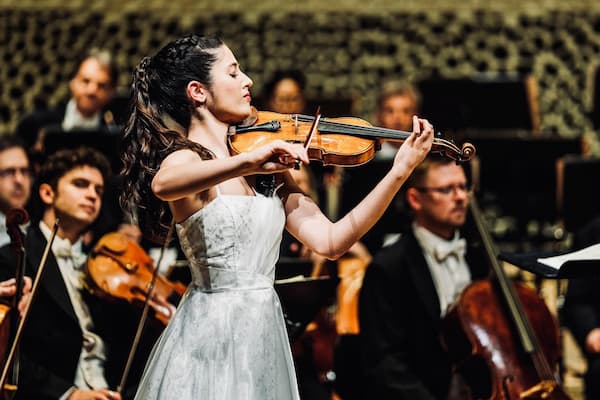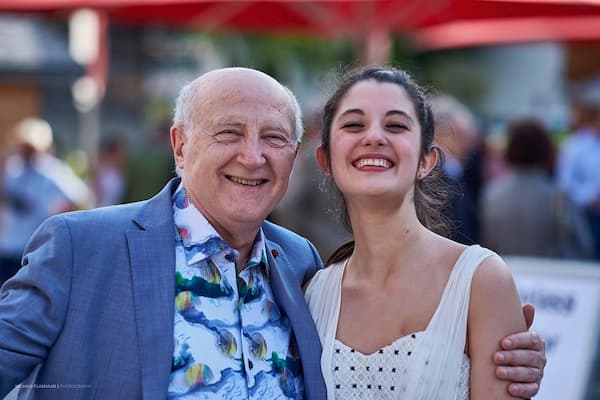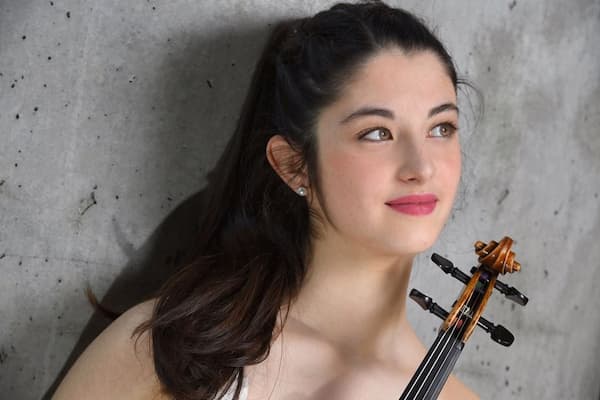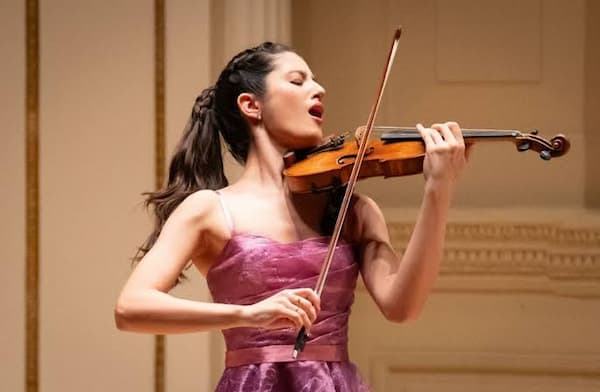Violinist María Dueñas burst into the international spotlight by winning a whole series of international violin competitions, among them the 2021 Menuhin Violin Competition. For her performance of Mozart’s Violin Concerto No. 4, Dueñas actually wrote her own cadenza. She was soon described as “seemingly unstoppable,” and she is considered the Spanish violinist with the greatest international profile. One of the most promising musicians of her generation, Dueñas signed an exclusive contract with Deutsche Grammophon in 2022.
María Dueñas: Menuhin Competition
Granada

María Dueñas
María Dueñas Fernández was born on 4 December 2002 in Granada, a city in the autonomous community of Andalusia, located in the foothills of the Sierra Nevada mountains. Although her parents did not play any musical instruments, they absolutely loved classical music. As Dueñas related in an interview, “we were listening to music every day in the car going to school. I remember growing up with the historical recordings of violinists like Menuhin, Heifetz and Oistrakh.”
Her parents took Maria to countless classical concerts, and she fell in love with the violin. In fact, she “told her parents to buy her a violin because she wanted to be a concertmaster of the orchestra.” She started violin lessons at the age of six and one year later enrolled at the
Ángel Barrios Conservatory in her native Granada. She made astonishing progress, and by the age of 9, she was learning the major violin concertos.
Ludwig van Beethoven: Violin Concerto in D Major, Op. 61 (María Dueñas, violin; Vienna Symphony Orchestra; Manfred Honeck, cond.)
Dresden

Boris Kuschnir and María Dueñas
With her young life on the crossroads, Dueñas secured a scholarship from Juventudes Musicales de Madrid in 2014. This allowed her to study at the Carl Maria von Weber College of Music in Dresden. In fact, the whole family came along. “We are three kids and my parents,” explained Dueñas. “It was such a big risk for everyone. What if I said I didn’t want to play violin anymore after a year?”
None of them spoke German, and Dueñas had to manage her music education and simultaneously her online Spanish schooling. After 18 months, the family was on the move again, this time to Vienna, in order for Dueñas to study with Boris Kuschnir. Dueñas is eternally grateful that “my family uprooted everything we had in Spain to move to Vienna with me, and with my sisters, who are also studying here. It’s such a huge sacrifice. Without their help, this would not have been possible at all.”
María Dueñas Plays Paganini’s 24 Caprices, No. 24 in A minor
Vienna

Dueñas is overjoyed to be in Vienna because it is “an amazing city with lots of opportunities.” She even learned Austrian ballroom dancing and spent her free time taking in the city’s museums, opera houses, and concert halls. And her teacher, Boris Kuschnir, “has been a great inspiration, both in terms of working on that individual sound and also understanding that specifically Austrian style and tradition.”
Dueñas has nothing but praise for Kuschnir, calling him “an incredible teacher, and an incredible person as well. He really considers each student’s individual needs.” She is particularly fond of Kuschnir’s “unending love for music and wish to try something new each day. This urge to look for something beautiful in every note and in life itself is really rewarding.”
Julian Gargiulo: Estro (María Dueñas, violin; Julian Gargiulo, piano)
Creativity

In addition to violin lessons, Dueñas has been taking classes in conducting, because “I’m very interested in really knowing what’s going on in the orchestra. It’s very important to play chamber music as well, to develop your listening skills.” She has also taken composition lessons, an area that has always held some fascination. “It actually all started with cadenzas: I wrote my first one for the Mozart Concerto No. 1, and after that, I wrote cadenzas for the other Mozart concertos and most recently for the Beethoven and Brahms.”
For Dueñas, composing cadenzas for masterworks is a very deep analytic process. “First, I have to look closely at the piece and its structure and identify which themes are most important, and on that basis, I try to combine the things that are also more important for me. I’ll maybe play around with the key and tonality a little, but I always try to stay very true to the essence of a concerto.” Since then, Dueñas has also composed several piano pieces.
For more of the best in classical music, sign up for our E-Newsletter
